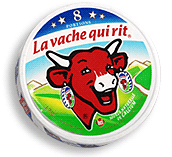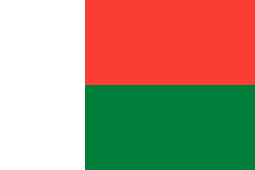The Laughing Cow
The Laughing Cow (French: La vache qui rit) is a brand of processed cheese products made by Fromageries Bel since 1921, and in particular refers to the brand's most popular product, the spreadable wedge.
| La Vache qui Rit (The Laughing Cow) | |
|---|---|
 | |
| Other names | Laughing Cow Cheese |
| Country of origin | France (produced worldwide)[1] |
| Region, town | Lons-le-Saunier[2][3] |
| Source of milk | Cow (Vache) |
| Pasteurized | Yes |
| Texture | Semi-soft |
| Aging time | Made from aged cheeses, but not aged itself |
| Certification | Trademarked brand name |
The product
The cheese is a blend of cream, milk and fresh and aged cheeses, particularly comté, which are pasteurized to stop the ripening process. Versatile and portable because of its pasteurization process, Laughing Cow can remain unrefrigerated for a limited length of time. The archetypal Laughing Cow cheese comes wrapped in the individual serving-sized foiled wedges, and they are packaged in a round, flat box. Consumers have to pull a little red thread around the box to open it, and the foil packaging also features a red tab for opening. The company was founded in 1921. The Laughing Cow is available in these formats in different worldwide markets:
- Triangles, squares or rectangles in various flavours
- Spreadable tubs
- The Laughing Cow Dip & Crunch (or Pik & Croq in mainland Europe), previously named Cheez Dippers, which are snacks consisting of bread sticks and cheese spread, and these come in four varieties; original, light, hazelnut and pizza
- Slicing blocks of The Laughing Cow with a harder consistency like that of butter
- Ma P'tite Vache Qui Rit, pods of cheese spread to be eaten out of the pod with a spoon, especially for younger children
- Toastinette processed cheese slices, similar to Kraft Singles
- Bite-sized cubes, in various flavours and designed to be served as aperitifs at cocktail parties - which are called Cheez & Fun in many European countries, and also Snack Bites in the United Kingdom, Apéricube in France, Belgium and the Netherlands, PartyCubes in Canada, Mini Cubes in Australia and New Zealand, and Belcube in Japan and South Korea. They are produced in 24- or 48-cube boxes of one flavour, e.g. blue, ham, salmon, chili pepper and olive, or they are produced in 24- or 48-cube boxes of a particular theme, e.g., 'Cocktails du Monde', 'Petites Recettes', 'Tex-Mex' and 'Indian'.
Discontinued formats of The Laughing Cow include:
- Giggles/Blop processed cheese pods for younger children
- Squeezy bottles
- Big Cheez Dipper (a larger version of Cheez Dippers)
- Cheez Double Dippers (which contained crispy bacon flavour bits in addition to bread sticks and cheese spread).
The Laughing Cow USA introduced a TV commercial in 2009 where the company introduced a new slogan, Have you laughed today? In 2010 they updated the brand's website to include cheese recipes.
Laughing Cow cheese is available in its original flavour, a light version with 7% fat, and an ultra-light version with 3% fat. In addition, flavoured versions of the cheese (such as ham, gruyère, garlic, paprika, mushroom, chèvre, bleu, hazelnut, pizza and onion) are also available in various markets worldwide.
Evolution of the brand
The Laughing Cow is red and white and jovial, and is almost always depicted wearing ear tags that look like the round boxes the cheese comes in (an example of the Droste effect). On April 16, 1921, Léon Bel[4] trademarked his brand, called La Vache qui rit, in France. In the trademark, the cow is said to have 'a hilarious expression'. Bel had made the original drawing himself, after seeing a travelling meat wagon during World War I called "La Wachkyrie", a play on the word for Valkyrie. In the beginning she was not laughing, she was not red and she did not wear ear tags. This patent was the very first branded cheese product registered in France. In 1924, illustrator Benjamin Rabier edited the drawing into something more like the image that prevails today. The blue and white stripes around the box date from 1955. Since 1976 both ear-tag boxes have been shown with the top-side visible. Before that year consumers were shown a top and bottom side. The current logo uses the Droste effect, with the laughing cow appearing inside the ear tags.[5]
Worldwide popularity
It has long been popular in the United Kingdom and Canada as a children's snack. The cheese has also been a constant, but hardly popular, product in the United States for a number of years. However, demand for the triangular wedges has increased significantly recently, since the light version of the product was suggested as a viable menu item to followers of the South Beach Diet. The question asked by the French, "Pourquoi La Vache Qui Rit rit?" ("Why is The Laughing Cow laughing?") has become synonymous with the product.
Groupe Bel announced on October 2, 2005, that they plan to open a 13 million Euro factory in Syria. This was the first such direct investment in that nation by a French food company.[6]
The product is localized by name nearly everywhere it is sold:
- La Vache qui Rit in

.svg.png)

.svg.png)







- The Laughing Cow in English speaking countries
- Die Lachende Kuh in German-speaking countries except

- البقرة الضاحكة (Al-Baqara Ad-Dahika) is the Arabic translation in Arabic-speaking countries, but it is recognized and sold by its original name, La vache qui rit
- La Vaca que Ríe in Spanish-speaking countries
- A Vaca que Ri in Portuguese-speaking countries
- Весёлая Бурёнка (Vessiolaia Bourionka) in

- ラッフィングカウ (Rafingu Kau) in

- 乐芝牛 in

- 笑牛牌 in

- La Mucca che Ride in

- Den Skrattande Kon in

- Den Leende ko in

- La Vache qui Rit, Gülen İnek in

- Krówka Śmieszka in

- Nevető tehén in

- Văcuța veselă in

- Весела Корівка (Vesela Korivka) in

- Veselá kráva in the

- Η Αγελάδα που Γελά (I Agelada pou Gela) in

- گاو خندان (Gav e Khandaan) in

- Sapi Ceria in

- Con Bò Cười in

- Ilay Omby Vavy Mifaly in

- مانگای دڵخۆش (Mangay Dlxosh) in Kurdish
In the countries of the former Yugoslavia, a very similar type of cheese produced in Croatia and called Zdenka is very popular and has become a generic trademark.
Other associations
- The product name and indicia were adopted by the crew of World War II German submarine U-69, whose sinking of the SS Robin Moor was significant to US entry into World War II.
- "La Vache qui Rit" is the name of an EP by late 1980s Washington, D.C., punk band Rain with connection to Dischord Records.
- Le Vache qui Rit is the name of a 1982 EP by UK Anarchist Punk band Zounds.
- "La Vache Qui Rit" is the name of a finishing move in the 1994 video game Primal Rage. The character Vertigo will move up to an opponent and transform them into a cow, which makes a disconcerted "moo" as it runs away.
- Former Egyptian President Hosni Mubarak was often jokingly referred to as 'La Vache qui Rit' because of his supposed resemblance to the cheese's logo.[7]
- La vache qui lit ("The reading cow") is the children's book prize of the city of Zürich, and a children's book program in the Auvergne region of France.[8]
See also
- Emmi AG - manufacturer of Swiss Knight brand of spreadable cheese wedges
References
- "The Laughing Cow, more than 90 years and still smiling". Groupe Bel. Archived from the original on 11 July 2016. Retrieved 28 May 2017.
- Birck, Danielle (6 November 2009). "La Vache qui rit". Radio France Internationale (in French). Retrieved 28 May 2017.
- "Découvrir". The House of the Laughing Cow (in French). Retrieved 28 May 2017.
- "The Laughing Cow". Bel Group. Retrieved 28 May 2017.
- Merow, Katharine (2013). "Escher and the Droste Effect". Mathematical Association of America. Archived from the original on 2 August 2013.
- "Bel cheese manufacturers open CAD 18.17 million factory in Syria". Business News Syria. Department of Foreign Affairs and International Trade (Canada). November 2005. Archived from the original on 10 August 2006. Retrieved 9 December 2007.
- Fisk, Robert (9 April 2007). "Mohamed Hasseinein Heikel: The wise man of the Middle East". The Independent. Archived from the original on 26 February 2011. Retrieved 28 May 2017.
- "Les Editions la vache qui lit". editionslavachequilit.com (in French). Retrieved 28 May 2017.
External links
- The Laughing Cow at The Bel Group's web site
- The Laughing Cow Brand site features cheese recipes and snack cheese information
- La Vache qui rit official site (in French)